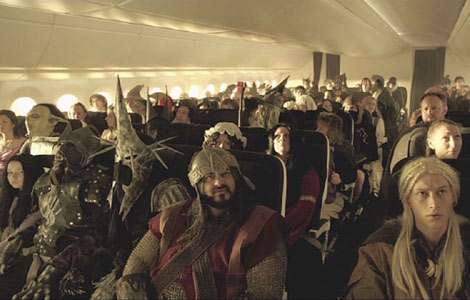
HOUSTON - With barely a week to go before the 2012 US presidential election, an expert here predicted that the race between President Barack Obama and Republican challenger Mitt Romney could be "very competitive" decided by voters in a few swing states.
Mark P. Jones, professor of political science at Rice University, also told Xinhua in an exclusive interview that he believed either Obama or Romney, once elected, will keep the US - China relations on the right track because the two countries have such a close relationship and share so many mutual interests.
A latest poll released Wednesday shows that Obama and Romney remain effectively tied, with Obama leading Romney among likely voters by a statistically insignificant margin of 47 percent to 46 percent. Pollings also show that neither candidate has held a clear lead since early October.
"We have a race that is increasingly competitive," Jones said, adding that "it is difficult to predict (the results) with any certainty." However, he said, Obama may have a better chance. "If I have to bet, I will still place my money on President Obama."
In Jones' view, votes in swing states -- states in which no single candidate or party has overwhelming support in securing the states' electoral votes, will be key to the US presidential election on November 6th.
The New York Times' swing states list for the 2012 election includes Colorado, Florida, Iowa, New Hampshire, Nevada, Ohio, Pennsylvania, Virginia, and Wisconsin. The USA Today/Gallup list has the same nine states as the New York Times, with the addition of New Mexico, North Carolina, and Michigan.
"The real election will be in five or ten what we call battlefield states , and in the end, a small number of states, such as Ohio, Virginia, Colorado, Nevada and Iowa are where the election will be decided," said Jones, adding currently roughly 90 percent of all campaigning advertising is occurring in about six states, including Ohio, Virginia, Florida, Nevada, Colorado and Iowa.
In choosing between Obama and Romney, Americans virtually are choosing between two distinctive alternatives for the country, according to Jones.
Americans "have two clear contrasts with Obama and Romney," Jones said. "President Obama offers a model with a larger emphasis for the government and the role of the government in the economy, as well as a broader social safety net, like healthcare for the poor. Romney looks more to the private enterprise and free market system to resolve the country's problems."
"Right now, I think the things are evenly divided between the two, and the question will be, in the end, which candidate is the choice of the very few number of undecided Americans, and how enthusiastic are the pro-Obama or pro-Romney partisans to get out to vote for their candidate. What matters is which candidate will turn his basic support to higher turnout rate," Jones said.
On candidates' strength and weakness, Jones said Obama, while continuing to make clear to the American public that Romney's economic plan has some serious flaws and Romney's presidency will be very hard on the lower-middle class and the poor, should make clear "his own plan how he will turn the US economy around and get the US out of the economic doldrums where we presently are."
A reality Obama has to face today is the waning enthusiasm for his presidency, Jones said. "The voters today are very similar in terms of composition as four years ago. The one difference that we do see is that there is not as much enthusiasm for Obama as it was four years ago. "
"Four years ago, Obama was viewed as the candidate of hope and the candidate of change. As the first African American candidate, people thought he will change the politics. Today, he still has supporters. But he is no longer viewed as the one to change the political system. He is viewed as another politician," Jones said.
Obama needs to appeal to middle and lower-middle class voters that he will provide them with lower tax and benefits, Jones said.
The president also should concentrate his forces in a small number of states he has been using as his electoral firewall. If he can hold on to these states, he will be guaranteed the election. The firewall includes Ohio, Colorado and Nevada. Ohio is key to Obama's reelection, Jones said.
As for Romney, Jones said the Republican candidate "more than anything else, needs to continue to develop empathy with the public." Romney is in the leaders and "he has nothing in common with most US citizens," Jones said, "his ability to reach out and work with them and demonstrate that he shares their pains and understands their problems is crucial."
Romney also needs to do a better job in reaching out to women, Jones said. "There are far more women prefer President Obama over Romney, he (Romney) needs to close that gap in a few key battleground states."
The US consumer sentiment hit a five-year-high in October. Jones called the rising consumer confidence "a positive signal" because it shows the US economy is not continuing to deteriorate, although improvement is modest. For the country's unemployment and underemployment, things are not getting much better, he added.
"This (the rising consumer sentiment) is a cause for optimism for the Obama administration because it shows there is gradual improvement, but it is happening very slowly," Jones said.
Though Obama and Romney have been exchanging barbs over who will be tougher on China once in office, Jones said no matter who will be the next president, US-China ties will remain on the right track because the US and China have such a close relationship, and "neither side benefits from a trade war or adverse relations."
Using China as a campaigning tool is "politically convenient, since China is such a large global actor and is a convenient target," Jones said, noting that such moves are political and only designed for the campaign.
In the campaigns, said Jones, candidates are using China as a convenient tool to attack their opponents, but after the election, no candidate has real desire to employ any anti-China policies because the two countries need each other for their own benefits.
"The US depends heavily on China purchasing our debts, while China depends on the U.S. as a market for its manufacture goods. Both countries have mutual interests in maintaining strong relations," Jones said.







